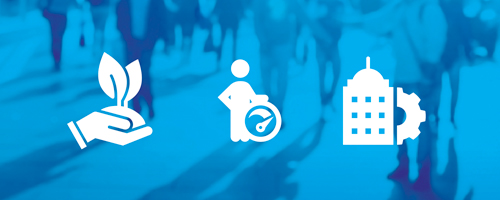Understanding the Key Components of the Lehigh Valley Entrepreneurial Ecosystem
It’s hard not to run across the terms incubator, accelerator, or coworking in the popular media channels related to entrepreneurship and innovation, including those right here in the Lehigh Valley. However, all too often people don’t fully understand the differences between the terms or what these types of programs offer startup and early-stage companies.
All of these kinds of programs and spaces have their proper place in the entrepreneurial ecosystem. They all play vital roles in bringing people together, fostering business relationships, and advancing the growth and success of small businesses in the community. In fact, the International Business Innovation Association (InBIA) recently rebranded itself because it has been serving a wider variety of programs. The organization serves over 2,100 members in more than 60 nations who include the leaders of business incubators, accelerators, university commercialization and entrepreneurship centers, and regional economic development stakeholders focused on building entrepreneurial ecosystems in their communities.
So what are these programs all about?
A business incubator is a program designed to create an environment for the successful development of entrepreneurial companies through an array of business support resources and services. Its mission is to produce successful firms that will leave the program financially viable and freestanding. In many cases, there is a physical space where these companies are residing that goes along with the programmatic elements like mentoring, business training, and assistance with funding the growth of the venture. Business incubation programs tend to span several years to allow client companies to reach a point of profitability and self-sustainability before graduating.
In the Lehigh Valley, there are two long-standing business incubation programs: the Bridgeworks Enterprise Center in Allentown and Ben Franklin TechVentures located on the Mountaintop Campus of Lehigh University. To an outsider, these may seem like competing programs, but in fact, it is quite the opposite. They are very much partners because they serve two unique audiences – Bridgeworks focusing on manufacturing, and TechVentures focusing on life science and technology companies. Together, these programs have helped launch dozens of companies that have created hundreds of jobs.
Similar in nature but on a much more intensive timeline are business accelerators. These programs typically take place over a three to six month period and come in one of two formats. First, there are accelerator programs that focus on getting companies from idea to marketable product. The goal is to get the team to build the product that’s in their heads while incorporating feedback from potential early customers. Other accelerators focus on getting the company to rapidly grow its customer base and revenues, while again making iterations on the early-stage product based on the feedback from actual customers. In both cases, the accelerator program typically culminates in a “demo day” where a select group of investors and venture capitalists are invited to see the pitches from the companies that will hopefully lead to an investment.
Although there are no accelerator programs located in the Lehigh Valley, just down the road in Philadelphia is DreamIt, one of the top-10 accelerator programs in the nation as ranked by Forbes. DreamIt runs cohorts focused on general technology, health, and education. Lehigh University’s Baker Institute for Entrepreneurship, Creativity, and Innovation runs a student idea accelerator each summer called LaunchBayC. It focuses less on starting a business and more on getting students from all disciplines to develop creative problem-solving skills, which are critical to being an entrepreneur or to being a productive team member in a corporation.
Lastly, there are coworking spaces. Born out of dense urban areas like San Francisco and New York City, these are spaces where people can rent a desk on a short-term basis as an alternative to working from home. Coworking spaces come in various shapes and sizes, from strictly desk space like Easton Coworks to spaces with both open desk areas and dedicated offices like SoBeCoWorks in Bethlehem, the Flex Launch & Coworking space located inside the Bridgeworks Enterprise Center, and Velocity I>A in Allentown.
There are other spaces around the Lehigh Valley that serve the entrepreneurial community including post-incubator locations like Pi: Partnership for Innovation in Bethlehem. These spaces allow early-stage companies to stay in the region when they no longer require the resources that a true incubator program provides.
All of these entrepreneurial support programs exist to serve the Lehigh Valley startup community. Whether you’re looking for a desk away from your home office or a full-fledged program that provides guidance, mentorship, and potential investment, there is a space and program close by to fit your needs.























